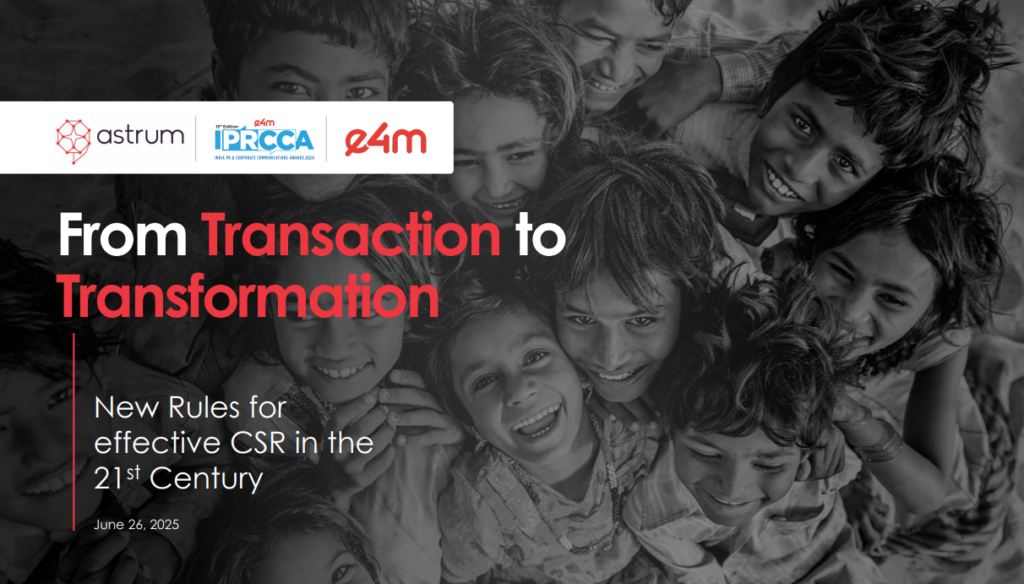Good CSR is not a cover for bad business

At the 15th edition of IPRCCC, Ashwani Singla, Founding & Managing Partner of Astrum, urged companies to stop thinking like donors and start behaving like Social Impact Organisations
“Good CSR is not a medicine for bad business. You cannot hide your follies behind CSR,” said Ashwani Singla, Founding & Managing Partner of Astrum, in a keynote session at the 15th edition of The India PR and Corporate Communication Conference.
Singla laid bare the reality of India Inc’s CSR (Corporate Social Responsibility) initiatives, urging companies to shift their lens — from transactional philanthropy to transformative social impact.
With this, he set the tone for a science-backed, purpose-driven approach to social responsibility — one that is rooted in dignity, empowerment, and measurable impact.
Drawing from Astrum’s year-long, comprehensive study which covered 2,000 interviews across India, including 1,900 CSR beneficiaries, Singla pointed out a critical flaw in the current CSR paradigm: its short-term, transactional nature.
“In a large sample size like ours, it’s no surprise that only 3 percent of private enterprises are seen as the face of change,” he noted, adding that, “Unfortunately, large amount of CSR today is just… spending money to tick a box. That’s why it’s transactional and not transformative.”
He emphasised that six to nine-month interventions cannot create lasting change in communities. “You can’t change lives in six months. Transformation takes sustained effort, localised implementation, and measurable outcomes,” he added.
Singla framed social impact as solving real-life challenges for communities, sustainably and holistically. “You don’t offer fish, you teach people how to fish,” he said. “Good CSR is not about check writing. It’s about working in the communities you want to serve,” he said.
He warned against CSR becoming a “passion project of your CEO” or “an international program that needs to extend its leg into India.” Instead, programs should be designed based on deep insights from the communities themselves — rooted in dignity, respect, and empowerment. To drive transformative impact, Singla urged companies to stop thinking like donors and start behaving like Social Impact Organisations (SIOs).
“If you’re thinking of yourself as a social impact organization, your focus and your purpose is first. If you are on the right road, chances are you will get to your destination,” he said.
Singla introduced Astrum’s proprietary “Social Impact Index,” a tool designed to help companies measure the reputational relevance of their CSR programs.
It integrates quantitative data, qualitative insights, and even neuroscience to track performance against key drivers like transparency, capability, and implementation strategy, he explained.
“Everything here is above 50 percent. Your biggest lever is whether you are seen as working for the greater good,” he said. “If not, you’re not a transformative change-maker.”
Singla also called on corporates to build “role model programs” — those that are so effective they influence government policy. “I’m not talking about advocacy,” he clarified. “I’m saying do such good work that the government wants to replicate it across geographies.”
Finally, he emphasised that CSR needs better storytelling — not just stats and sustainability reports, but narratives that showcase genuine transformation. “What’s your story going to be?” he asked the audience. “Stories, stats, or sound bites?”
As AI and real-time technology open new frontiers for monitoring and implementation, Singla urged companies to leverage these tools to enhance accountability and outcomes. But technology alone won’t solve CSR’s credibility crisis.
“It’s time we change the word NGO to SIO — Social Impact Organisation,” he concluded. “Because transformation needs purpose. And purpose begins with the right mindset.”
The original article is published on Exchange4Media Read Here
Sharada Sharma, Co-Founder and Chief Science Officer of Astrum, delves into the key findings of the report in her expert analysis. Read her blog here
To download the full report, Click here

Founding Managing Partner
Ashwani Singla is the Founding Managing Partner of Astrum, India’s first specialist reputation management advisory that uses science of persuasion to understand and shape public opinion ethically. Ashwani has made his passion of generating proprietary insights to inform strategy and messaging, as the bedrock of his work and is a sought after trusted advisor and strategist by both the C-Suite & Political leaders.
He along with his multi-disciplinary team of professionals works closely with the C-Suite to resolve the complex challenges they face in successfully negotiating the landscape of Reputation, Risk and Regulation. Applying the same principles of insights led thinking, he advises senior Political leaders to win the mandate of their voters, including the historic 2014 Lok Sabha campaign for the BJP.
Prior to founding Astrum, Ashwani, was the Asia MD, of PSB Research and the CEO & Co-Promoter of Genesis Burson-Marsteller (now Burson). He is the Founder Executive Director of Impact Research & Measurement, India’s leader in media intelligence & measurement and serves on the advisory boards of several companies.

